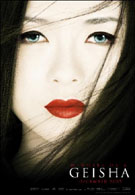Other than proving that you can make a lousy movie about Japan using Chinese actors and American money, Memoirs of a Geisha seems bent on showing that geishas, who have pretty much died out, are not prostitutes. I had always assumed they were, so this was a revelation. I guess my dad, who had an opinion about everything, was wrong. He used to recite a little rhyme in his native Polish, "Geisha: coorva ah leh nieh tootayshah." "Geisha: a whore, but not from around here."
"We are not courtesans, we are not wives. We sell our skills, not our bodies. We are moving works of art," says a geisha den mother. In a pre-release interview, Geisha director Rob Marshall (Chicago) called geishas the "fashionistas of their times", and, as we all know, fashionistas can't be whores. Since what geishas do or don't do behind closed doors is open to speculation, let's leave the whore vs. walking work of art question to the historians and get on with the film.
Memoirs of a Geisha was adapted from the novel of the same title by Arthur Golden, and based in part upon the life story of an actual geisha who ended up suing Golden for revealing her identity in the book. The producers called in some big names to add weight to the film, including Pulitzer Prize-winning playwright Doug White to co-write the script, and Yo-Yo Ma and Itzhak Perlman for the soundtrack. The choice of Chinese actors to play geishas was controversial, and particularly galling to the Japanese. Director Marshall maintains that he cast the best candidates for key roles regardless of nationality or race.
The story, told as a memory by geisha Sayuri (Chinese star Ziyi Zhang of Crouching Tiger, Hidden Dragon) is of a young girl who, circa 1929, after her mother's death, is wrested away from her family and taken to a geisha house in Kyoto, where she undergoes what appears to be a cross between Marine boot camp and Joffrey Ballet training. Still a child, she has a street encounter with a mysterious, handsome stranger, the Chairman (no, not the late Frank Sinatra, but a rich, suave chap played by Ken Watanabe, who is actually Japanese). In a vaguely pedophilic scene, he approaches the girl and offers to buy her a snow cone. With sweet plum syrup staining her lips, she declares, "Now I'm ah geisha tew!" The Chairman, we suspect, Will Be Back.
The rendering of Sayuri's twisted journey to the pinnacle of geishahood, impeded by a jealous rival, Hatsumomo (Li Gong), is of K-Mart romance novel/TV movie quality. The characters are poorly developed and the story suffers for it. Against a backdrop of majestic scenery struts a cavalcade of cliches. Hearts die a slow death, hope is shed like leaves, and now, please stop me before I go into sugar coma! As an additional treat, we're fed the samurai-lite point of view. Nobu (Koji Yakusho), the danna (sugar daddy) of geishas, intones, "Three things matter in life: sumo, business, and war. Understand one and you know them all." Substitute football for sumo, and I'm right there with you, man!
None of this coalesces into anything of substance. The moral ambiguities of geishahood are superficially addressed, and sexual slavery and flagrant physical and mental abuse are given a rosy tinge. Temper the sordid with the fashionista-glamorous, falalalala, lala lala. The film could have dealt with important questions such as the old "Who's really the trick?" conundrum in sexual or sexualized relationships between persons of unequal power or influence, but the creators of Geisha have chosen to stick with sentimental mush. The haiku-like pronouncements sprinkled throughout the film have all the depth of a "Confucius say" joke. All this extravagant fuss and folderol, and the joke's on us.











